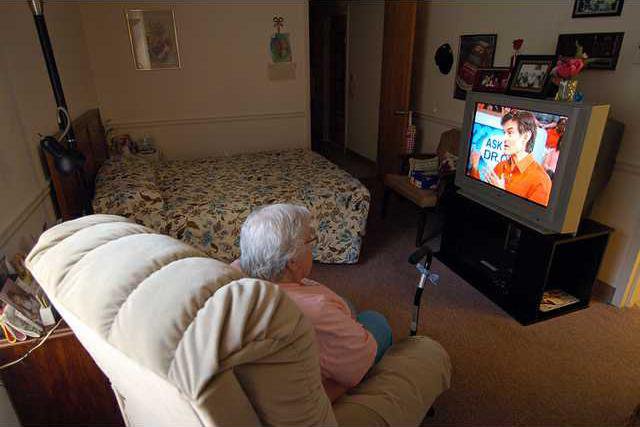FLOWERY BRANCH — A crisp fall breeze whipped across the porch of the Country Heritage personal care home.
Ann Walton gripped the arms of the rocking chair and gazed into the distance.
"The heart doesn’t pay the bills, but you’ve got to have heart to do this," she said.
Her nearly three decades of providing care in a group-home setting has hit a serious roadblock, as she sorts through an issue affecting Medicaid payments, a key income source.
State Department of Community Health officials learned in October 2007 that Walton was using the services of a licensed practical nurse whose license had expired "due to an oversight on her part and mine," Walton said.
"Had she sent in a check for probably $60, that would probably been all there was to it," she added.
The nurse had told her "that in all previous years, she had always gotten a reminder in the mail (to) renew her license," she said. "In 2007, no notices were sent out."
As a result, the state is requiring that Walton pay back $33,000 in Medicaid disbursements.
"I know I should have caught the (renewal) date. It was an oversight on my part, and I can say I should have been fined. But I think the penalty that’s being put on me is not just," Walton said.
The state "started out wanting $38,000," she added.
"They are recouping everything for that nurse’s visits. It was like the nursing visit was all that counted — the fact that we were taking care of them 24/7, doing everything else, didn’t matter."
Joye Burton, media relations manager for the Department of Community Health, said Thursday that the department "doesn’t speak on specific cases."
Walton opened her first home in Martinez for 11 residents 28 years ago, leaving behind her job as an executive secretary.
"I had always loved older people, so when I first learned about personal care homes, I said that’s what I want to do," she said.
Personal care homes are "residential-care settings for people who can no longer live independently and who require some supervision but do not require clinical care or support," according to a document published in 2001 by the Health Strategies Council and Department of Community Health.
"They provide housing, meals, supervision and some assistance with activities of daily living to residents who may not need the level of skilled care provided in nursing homes."
Walton noticed there were plenty of personal care homes in Martinez, near Augusta.
"But there was nothing up here at that time and I had this land, which I inherited from my daddy," said Walton, a Flowery Branch native. "After we opened the first house, we had people about knocking the doors down, so I told my husband, ‘Doug, we need to do another one.’"
Their first home was licensed for 15 people and the second one for 20. Both are on Conner Road, off Jim Crow Road.
After the October 2007 discovery, Walton shut down the first home "to get out from under some of the bureaucracy and craziness," she said.
"So right now, this (second) home is the only home in Hall County that accepts Medicaid residents," she said.
Over the years, "I’ve hired many nurses ... and because I am a Medicaid provider, we have to have two nursing visits per month. Mostly I’ve used a (registered nurse) for the supervisor visit and a (license practical nurse), who is supervised by the RN."
Walton hired the LPN involved in the dispute in 2003.
"She was highly recommended," Walton said. "She proved to be very dedicated, one of the most conscientious nurses I’ve ever had. Her license was current when she was hired."
Walton has gone through several processes, including a mediation hearing, to clear up the matter.
"If I agree to their draft proposal, they will deduct $2,000 a month out of the check they send me," she said. "They only pay me $35 and 4 cents a day."
The financial implications are huge for Walton and her husband.
"It means a very, very tight ship. If my husband and I weren’t doing all that we do (in maintenance and upkeep), we couldn’t meet expenses," she said. "We draw $72,000 a year for this business — that’s for both of us being on call 24/7."
The episode has upset her son, Brad Walton, as well.
"This would be the equivalent of letting your driver license lapse and I’m going to take your car and half your income for the year. There is no parity for this," he said. "This has caused ... a lot of financial difficulty."

